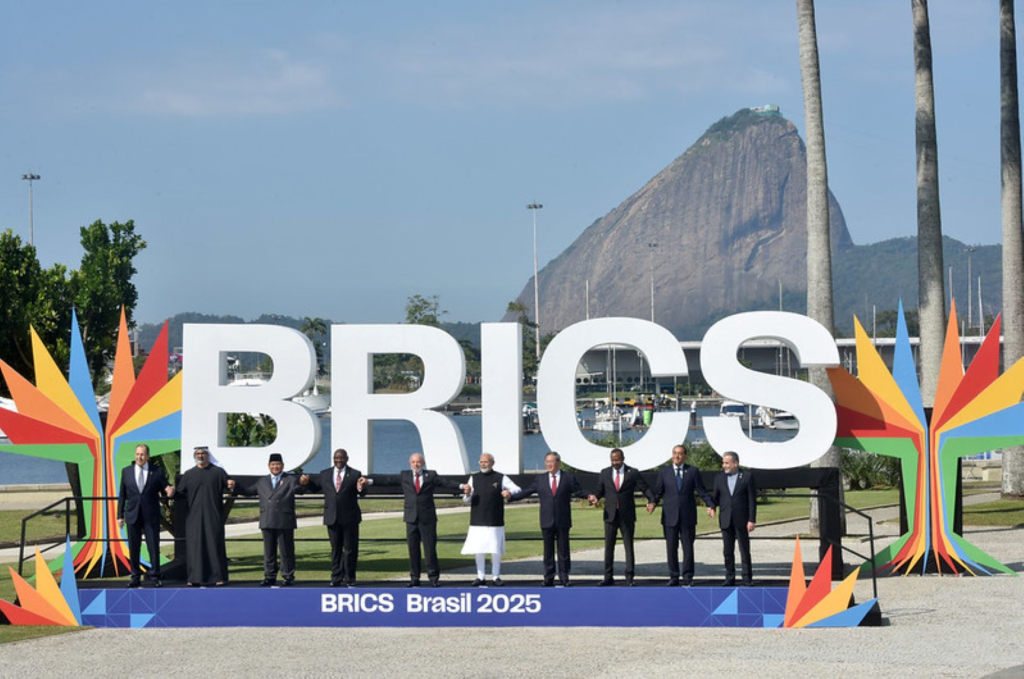
With support from the Federal Government, proposal marks a new chapter in Brazil’s international ambition and reinforces the role of Rio as a bridge between South Global
In a movement that can change the international geopolitical map, the Rio de Janeiro City Hall officialized on Monday (7) its candidacy to house the permanent headquarters of BRICS. The announcement was made during a symbolic ceremony at the city’s palace, when Mayor Eduardo Paes handed President Lula (PT) a letter of intention formalizing the request. The idea is to offer the historic building of the Brazilian Jockey Club, located in the central region of the city.
The building, designed by the renowned architect Lúcio Costa, has over 83,500 square meters and carries decades of cultural and political history of Brazil. Its strategic location, at a central point and easily accessible, coupled with the beauty and tradition of space, make it a viable and symbolically rich option to host a global institution.
Also read:
‘Black Kid’ follows arrested by plan to kill Lula; What is known
Atlas/Bloomberg: Lula strengthens with greater popular support of the year
The proposal seeks to position Rio de Janeiro as protagonist in the international diplomatic scene, reinforcing the role of the city as a convergence center between cultures, economies and ideas. According to the city, the choice of Rio as the headquarters of BRICS would bring global visibility, strengthening the city’s international image and significant increase in job creation, as well as incentive to tourism and attracting foreign investment.
“We are talking about an important step towards the future,” Paes said during the event. “The river is prepared to receive representatives from the member countries and offer all the necessary infrastructure for BRICS to continue advancing in its discussions in a continuous and productive way.”
Also in an official note, the municipal executive pointed out that the initiative reaffirms the city’s commitment to multilateralism and international cooperation. “By recognizing the importance of BRICS in the reform of global governance towards a more equitable development, Rio de Janeiro seeks to facilitate continuous dialogue between member countries, promoting cooperation and transforming theories into concrete practices,” the document says.
The decision gained strength after the last summit of the bloc, which brought together heads of state and authorities from 36 countries in Rio on July 6 and 7. The meeting, which attracted about 4,000 participants, showed the city’s ability to host high -level international events, reaffirming its potential as a global political and economic hub.
BRICS: emerging block with global weight
Currently, the BRICS brings together 11 countries: Brazil, Russia, India, China, South Africa, Saudi Arabia, Egypt, United Arab Emirates, Ethiopia, Indonesia and Iran. Together, these countries represent 46% of the world’s population and 37% of global GDP – numbers that reflect the growing weight of the block in international decisions.
Created in 2009, BRICS emerged with the objective of expanding the influence of emerging economies on the global scenario, challenging traditional power centers such as the United States and Western Europe. In recent years, the group has worked to expand its performance, proposing reforms in the International Monetary Fund (IMF), in the World Trade Organization (WTO) and defending the diversification of currencies used in international transactions.
During the dome in Rio, the bloc leaders also issued a joint statement criticizing the recent tariffs imposed by the United States, which considered a threat to global economic stability. BRICS finance ministers warned that protectionist measures can generate “uncertainty to international economic and commercial activities”.
Tension with the US: Trump raises Tom against BRICS
While the block tries to consolidate its position in the multipolar world, the United States seem to increase the pressure on its members. President Donald Trump has once again attacking Brics on social networks, stating that any country that adopts policies contrary to US interests will be punished with an additional 10%rate.
“Any country that aligns with BRICS anti -American policies will be charged with an additional 10%tariff. There will be no exceptions to this policy,” Trump recently wrote.
This is not the first time Trump has expressed criticism of the block. He has already suggested rates of up to 100% if Brics countries launch a single currency that can compete with the US dollar. In addition, he defends a more aggressive attitude in international trade, arguing that this will help boost national industry and protect US jobs.
Despite the hard rhetoric, there is confusion as to the implementation schedule of these tariffs. Initially planned to take effect in April, they were postponed for three months and later rescheduled to August 1. However, different voices within the US government have given contradictory signs about the exact date.
The US Secretary of Commerce, Howard Lutnick, said the tariffs will begin to be applied on August 1, while Treasury Secretary Scott Bessent said that this date should not be interpreted as a new definitive deadline.
A world in transformation
BRICS growth reflects a profound change in the world order. While old Western powers face internal crises and political divisions, emerging countries seek to build new alliances and forms of cooperation. The block has discussed from alternative dollar payment mechanisms to shared development funds.
For experts, choosing a permanent headquarters can mark a new chapter in BRICS history, making it even more relevant on the global board. And Rio de Janeiro, with its international vocation and historical legacy, comes as a strong name in this race.
“The city has everything to house something so important and transformative,” says an international analyst who closely follows the topic. “In addition to having the infrastructure, the river carries a multicultural and cosmopolitan identity that combines with the BRICS mission.”
If the proposal is accepted, the Brazilian Jockey Club could become the scene of debates that will shape the future of the economy, diplomacy and global governance. A new chapter begins to be written-and perhaps have as its main address one of Brazil’s postcards.
With information from Agência Brasil and BBC
Source: https://www.ocafezinho.com/2025/07/08/cidade-maravilhosa-e-candidata-a-sede-do-brics-confira-a-proposta-historica/

